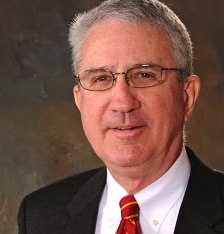State chamber boss talks globalization in the age of Trump, marijuana in Arkansas, 2017 legislative agenda
by December 2, 2016 1:20 pm 337 views

Arkansas State Chamber of Commerce President and CEO Randy Zook said globalization will continue in the administration of President-elect Donald Trump. He also expects marijuana legislation to “take the oxygen from the room” for at least the first 30 days of the state’s 91st General Assembly.
On globalization, Zook classified much of Trump’s push against it “campaign rhetoric” that he expected would tone down in the coming months.
“I think globalization will continue,” he told Talk Business & Politics after a Friday morning (Dec. 2) breakfast speech at a Fort Smith Regional Chamber of Commerce meeting on the University of Arkansas at Fort Smith campus. “Incomes are rising all over the world. Markets are growing. Demand is increasing. And you have to be prepared to meet those demands wherever they are.”
The reality, he noted, is that most offshore manufacturing is offshore for a reason other than cheap labor.
“It goes offshore to serve those markets. It doesn’t go offshore just to get the cheaper labor to sell the product back into the U.S. They (manufacturers) put a plant in China to produce products to share in China. We want that to continue. We want to engage the rest of the world or be suppliers to the rest of the world. Ninety-five percent of the people in the world are not living in the United States. They’re in other countries, so we’ve got to be active in those markets. We think the campaign rhetoric is going to reflect that ultimately.”
Zook said business plans “will continue to evolve” in the age of Trump, and ultimately the President-elect will understand that.
“He’s a business guy. He’s a dealmaker. But at the same time, he’s a hell of a salesman.”
Zook believes the good news from a Trump administration, particularly regarding manufacturing, is “those few companies that maybe have been driven offshore to Mexico or South America or somewhere else for cheaper labor — I think policies are going to change and the environment is going to improve in the U.S., so they’re not driven off.”

“That’s kind of what has happened,” he added. “It’s the permitting. It’s the rules. It’s the processes more than it is the wage rate.”
At Thursday’s Carrier press conference announcing the air conditioning manufacturer would stay in Indiana instead of offshoring to Mexico, Trump quipped Carrier was more excited about the loosening of regulatory restrictions than any tax incentives. On Friday, Zook said he could believe that statement.
“That (regulatory reform) is more important than a lot of the other stuff.”
MARIJUANA IMPLEMENTATION
Also Friday, Zook told the Chamber audience marijuana regulations would consume much of the General Assembly’s opening agenda when it begins in January, sharing scenarios such as rules for whether a business will have to pay worker’s compensation for medicinal marijuana use.
“Likely you will,” he said.
Another scenario: “Say you have a forklift operator who has his marijuana card, and he goes out and smokes a joint on his break to help with his pain. Then he goes back to work moving pallets around. My guess is the transfer of goods will be much slower,” Zook joked, before stating “those are the kinds of details legislators will have to work out.”
He continued: “What about a school teacher? Can a school teacher with a marijuana card smoke a joint at lunch and then come back in again? Those are the kind of nuts-and-bolts, down-in-the-weeds issues that will have to be worked out.”
On how the Chamber – which actively campaigned against the medical marijuana amendment – will approach the budding new industry, “conversations are underway, but nothing is resolved,” Zook told Talk Business & Politics after the event. “If I gave you the questions we’ve come up with — it’s like 10 pages of single-spaced questions — and we’re going to have to tackle them one at a time.”
“It’s going to take a while, probably a couple of years to get it figured out and really implemented properly,” he said. “Just as an example, the first bill introduced in the House, pre-filed, was to extend the period of implementation from 180 days rather than 120 days because they need more time to get the regulations and rules in place so that people don’t just go crazy, going out and growing marijuana.”
Asked if any marijuana businesses had been in touch with the Chamber, Zook said, “None with us, but I think we’re still pretty small potatoes until we get the rules of the road in place. Once we get those, it’ll pick up. The governor’s first task is appointing the Marijuana Regulation Commission. That’ll be the first sign to get into play.”
CHAMBER’S 2017 LEGISLATIVE AGENDA
Lastly, Zook shared a glimpse at the Arkansas State Chamber of Commerce and Associated Industries of Arkansas’ legislative agenda for 2017. During the 91st General Assembly, the organizations will be pushing on dozens of issues. Priorities will include the following:
On taxes, the push will include seeking a complete reduction in the sales tax on repair and replacement of machinery and equipment used directly in manufacturing, and eliminating the requirement that manufacturers have a direct pay permit to take advantage of this reduction. The chamber also hopes to remove property tax on inventories.
With workers’ compensation, the chamber will lobby for a method to mitigate employers’ increased cost exposure from the closing of the Death and Permanent Disability Trust Fund, and reduce opioid abuse and provide better more consistent care for injured workers through the adoption of evidence-based treatment guidelines.
The chamber also plans to support re-adoption of the Arkansas Works program. Arkansas Works is Gov. Asa Hutchinson’s version of the private option, the state program that uses federal Medicaid dollars to purchase private health insurance for Arkansans with incomes up to 138% of the federal poverty level.
On economic growth, the chamber lobbying will include a review of the Arkansas Economic Development Commission’s “resource allocations, client generation activities and outcome metrics,” and a call for restoring the Quick Action Closing Fund to the original level of $50 million. The chamber is also planning to push for tax credits to offset 100% of corporate income tax “on a discretionary basis or for certain tiers.”
The chamber also plans to have a voice in the education discussion, including a call to move school board elections to the general election date. The chamber also wants the legislature to do more to boost reading skills among grades 4-12.
